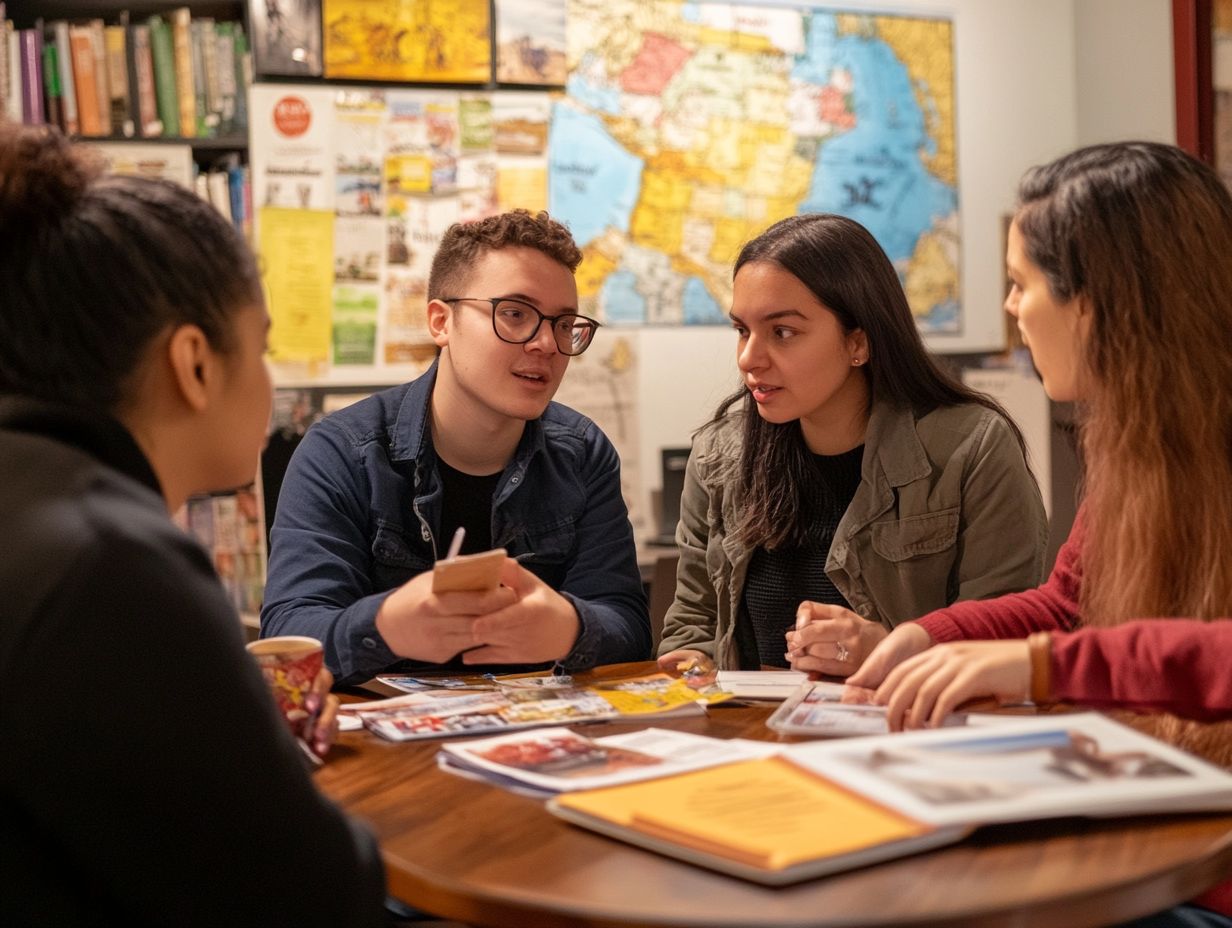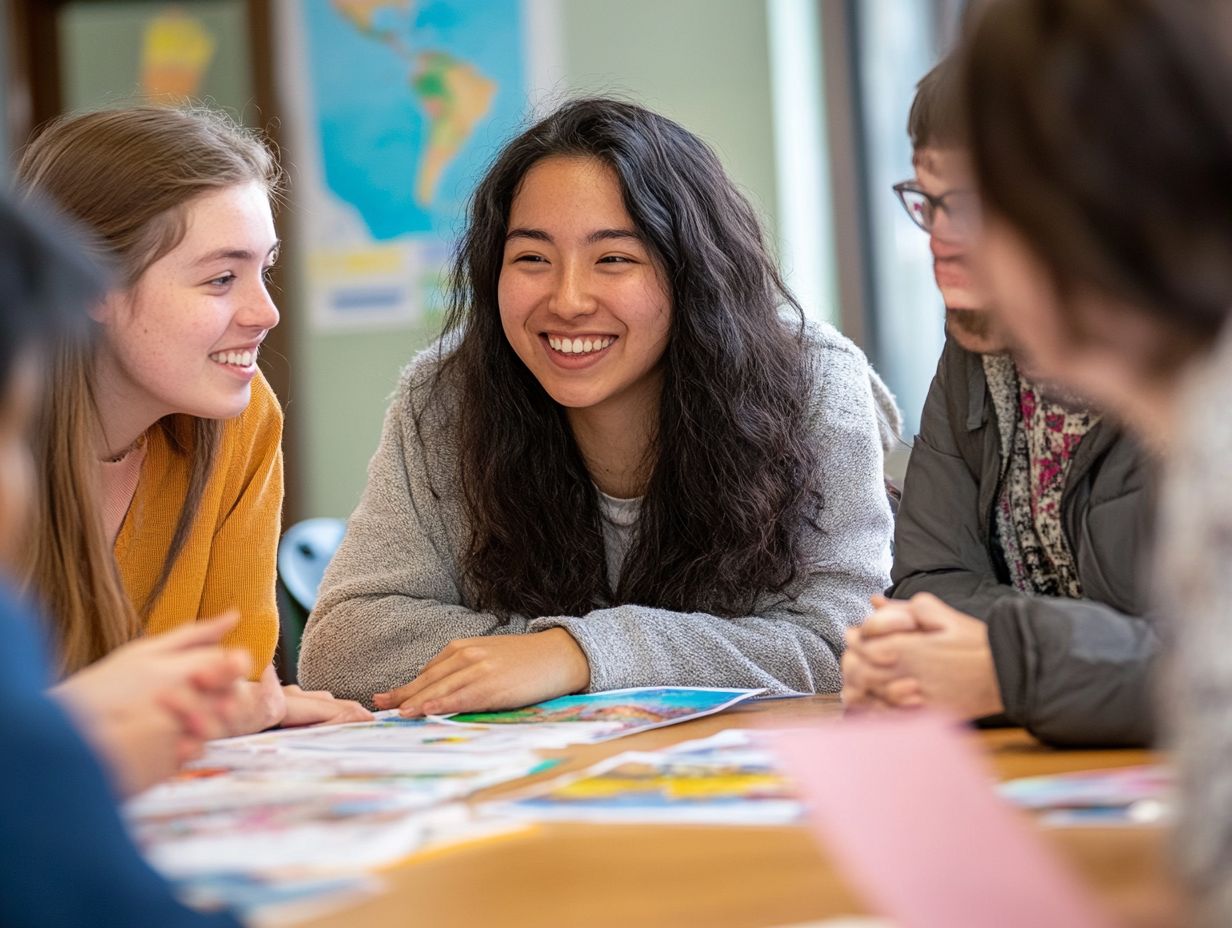Are There Age Limits for Study Abroad?
Studying abroad is a transformative experience. It unlocks vast opportunities for personal and professional growth at any age.
Many individuals aspire to immerse themselves in new cultures, elevate their education, and broaden their networks across the globe.
But you might wonder, Am I too old to study abroad? This article delves into the concept of studying abroad, highlighting many benefits it offers, addressing common age-related misconceptions, and examining the unique challenges older students may encounter.
You ll find essential tips on how to prepare for a rewarding study abroad experience. These tips are tailored for learners at any stage of life.
Contents
- Key Takeaways:
- What is Studying Abroad?
- Benefits of Studying Abroad
- Age Limits for Studying Abroad
- Considerations for Older Students
- How to Prepare for Studying Abroad at Any Age
- Frequently Asked Questions
- Are there any age limits for studying abroad?
- Is there an ideal age to study abroad?
- Can senior citizens study abroad?
- Are there age limits for scholarships and financial aid for studying abroad?
- Do I need to be a certain age to obtain a student visa for studying abroad?
- Can I still study abroad if I am a non-traditional student?
Key Takeaways:

- Studying abroad is an invaluable opportunity for personal and professional growth, regardless of age.
- While there may be common age restrictions for studying abroad, there are often exceptions and accommodations for older students.
- Older students should consider the unique challenges and opportunities that come with studying abroad and plan accordingly to make the most of their experience.
What is Studying Abroad?
Studying abroad presents you with a remarkable opportunity to pursue your education in a foreign country. It offers a rich array of international programs crafted to elevate your academic qualifications and expand your global perspective.
This enriching experience enables you to immerse yourself in diverse cultures and gain unique insights that foster personal growth. You can pursue your educational aspirations through varied academic curricula.
Destinations such as the USA, UK, Canada, Japan, Germany, and Australia offer countless opportunities for you to excel academically while cultivating a broad view of the world.
Benefits of Studying Abroad
Studying abroad offers incredible benefits! It greatly enhances your personal growth, propels career advancement, and fosters lasting friendships, making it a truly valuable investment in your future.
As you immerse yourself in a new culture, you ll find your career prospects blossoming. You will develop key skills that employers find irresistible think adaptability, cultural awareness, and language proficiency.
Additionally, there are numerous scholarships and financial aid options designed to ease the financial strain of studying abroad. This ensures that even those with limited resources can embark on this transformative journey.
Personal and Professional Growth
Participating in a study abroad program opens doors to invaluable opportunities for your personal growth and professional development. It helps you achieve your educational goals in a vibrant global landscape.
By immersing yourself in diverse cultures and academic environments, you broaden your global perspective and acquire essential life skills like independence and resilience.
This experience equips you with critical thinking and adaptability qualities that are increasingly in demand in today s job market. As you tackle new challenges and engage with a variety of people, you cultivate empathy and intercultural communication skills, making you a more competitive candidate for future roles.
Networking opportunities are plentiful, connecting you with industry professionals and fellow students from around the world. This further enriches your educational journey. These connections can lead to internships and job prospects, greatly influencing your career trajectory and expanding your understanding of global dynamics.
Age Limits for Studying Abroad

Age limits for studying abroad can differ greatly depending on the specific program, the institution, and the country you re considering. Many international programs are quite flexible, welcoming a diverse range of age groups.
While traditional undergraduate courses typically cater to younger adults, mature students are discovering a wealth of opportunities to advance their education through postgraduate programs and various academic offerings that don t impose strict age limitations.
Don’t let age hold you back! Explore your options and take the leap into an enriching study abroad experience today!
Common Age Restrictions and Exceptions
Common age restrictions for study abroad programs typically arise from the entry requirements established by universities and scholarship providers. Many programs target high school graduates or undergraduate students, usually requiring participants to fall within the age range of 18 to 30. However, there are exceptions that welcome older candidates, particularly mature students or professionals eager to expand their educational horizons.
For example, some institutions in the United Kingdom and Australia offer specialized courses designed for non-traditional students, making it possible for those over 30 to enroll. Certain scholarship programs, like Fulbright or Erasmus, often take into account applicants with extensive work experience or relevant qualifications, to broaden their eligibility criteria.
Countries implement varying policies regarding age limitations; while some prioritize youth engagement, others embrace the concept of continuous learning, fostering inclusive environments for all age groups. Understanding these differences helps you find global education opportunities, regardless of your age.
Considerations for Older Students
Older students face unique challenges and opportunities when studying abroad. These can greatly impact their education and personal growth.
These seasoned learners may grapple with the complexities of balancing academic obligations alongside family or work commitments. However, they also bring a wealth of life experiences and perspectives that not only enrich the learning environment but also cultivate meaningful connections with their peers.
Challenges and Opportunities
While you might encounter challenges such as adjusting to a new academic environment and juggling various responsibilities, you also stand to gain unique opportunities to connect with a diverse array of students and engage in enriching experiences! The potential for personal growth through volunteering and internships is especially beneficial if you’re looking to broaden your global perspective.
Navigating cultural differences can feel daunting at first, but it often leads to profound personal transformation. As you engage with peers from varied backgrounds, you ll not only gain insights into new cultures but also cultivate essential skills like adaptability and resilience.
Participating in community service projects or internships will enhance your resume and expand your connections, forging lasting relationships that can be invaluable for your future career.
Through these interactions, many mature students discover a renewed sense of purpose and direction, setting the stage for enriching life experiences.
How to Prepare for Studying Abroad at Any Age

Preparing to study abroad, no matter your age, requires a thorough grasp of the application documents, entry requirements, and proof of your ability to speak and understand the language essential for securing a spot in international programs.
You must ensure that your personal statement compellingly expresses your motivations and aspirations while also addressing any financial considerations through scholarships and other funding opportunities.
Important Factors to Consider
When preparing for your study abroad experience, there are several key factors you must consider. You’ll need to gather the necessary application documents, understand the entry requirements for your desired program, secure language proficiency certifications, and assess your potential financial needs. Each of these elements is vital for ensuring a seamless transition into the academic landscape of a foreign country.
It s essential to delve into the cultural and social nuances of your host country, as embracing new customs can significantly enrich your overall experience. Networking with current students or alumni can offer invaluable insights into what lies ahead and how to forge meaningful connections abroad.
Time management skills are also crucial; balancing your academic responsibilities with exploration can be quite the juggling act. Establishing a clear financial plan that encompasses tuition, living expenses, and unexpected emergencies is key. This preparation will alleviate stress and pave the way for a truly fulfilling experience while studying in a new environment.
Start your journey today and discover the world!
Making the Most of Your Study Abroad Experience
To maximize the benefits of studying abroad, seek out unique experiences. These experiences contribute to personal growth and foster lifelong friendships.
Engaging in local activities and forming connections with peers enriches your time abroad. Participating in volunteering opportunities creates lasting memories.
Immersing yourself in the local culture is essential. Join community groups, attend cultural events, or participate in local workshops.
These interactions provide deeper insights into the host country s values and traditions, enhancing your overall experience.
By stepping out of your comfort zone and trying new activities, you can broaden your horizons and cultivate adaptability.
Building meaningful relationships with both locals and fellow international students creates a support network that encourages personal development and cross-cultural understanding. Cross-cultural understanding means recognizing and appreciating the differences and similarities between cultures.
Such connections often lead to opportunities for collaboration, friendships, and unforgettable adventures.
Frequently Asked Questions
Are there any age limits for studying abroad?

There is no universal age limit for studying abroad; it varies depending on the country, program, and institution. Some programs may have a minimum or maximum age requirement, but many are open to students of all ages.
Is there an ideal age to study abroad?
There is no “ideal” age to study abroad; it depends on individual goals and circumstances. Some students choose to study abroad during their undergraduate years, while others may wait until after graduation or during a gap year. It s always a great time to explore the world through study abroad!
Can senior citizens study abroad?
Absolutely! Senior citizens can study abroad if they meet program requirements and are physically able to participate. Many programs offer special accommodations for older students, such as homestay options or shorter program durations.
Are there age limits for scholarships and financial aid for studying abroad?
Some scholarships and financial aid may have age restrictions, but many opportunities are available for students of all ages. It is important to research and apply for scholarships early to increase your chances of receiving funding.
Do I need to be a certain age to obtain a student visa for studying abroad?
Student visa requirements vary by country, but age is typically not a factor in the application process. However, some countries may require minors to have a guardian or sponsor while studying abroad. Research the specific visa requirements for your chosen destination.
Can I still study abroad if I am a non-traditional student?
Yes! Non-traditional students, such as those who are married, have children, or are returning to school after a break, can still study abroad. Many programs offer flexible options for non-traditional students, such as part-time or online courses, to accommodate their unique circumstances.




